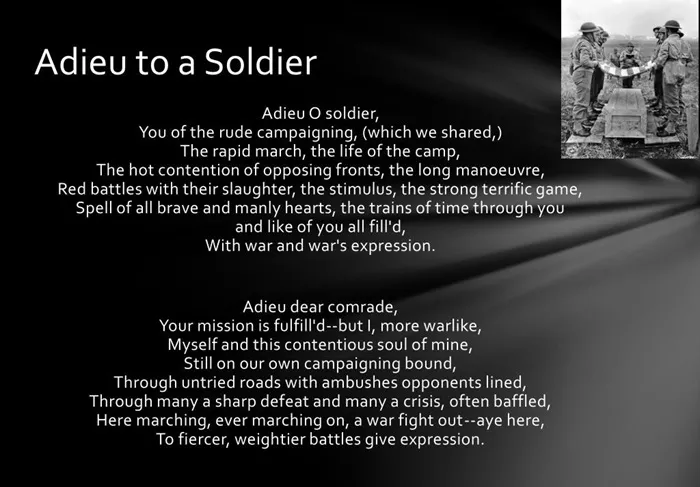Welcome to Poem of the Day – Adieu to a Soldier by Walt Whitman.
Adieu to a Soldier is a poignant wartime poem that pays heartfelt tribute to soldiers and the sacrifices they endure. With its deep emotional resonance and universal themes, the poem captures the essence of courage, loss, and hope. It is penned by Walt Whitman, one of America’s most celebrated poets, known for his exploration of humanity, democracy, and the harsh realities of war. Through this piece, Whitman’s profound empathy and reverence for those who serve shine brightly, making it a timeless work of literary art.
Adieu to a Soldier Poem
ADIEU, O soldier!
You of the rude campaigning, (which we shared,)
The rapid march, the life of the camp,
The hot contention of opposing fronts—the long maneuver,
Red battles with their slaughter,—the stimulus—the strong, terrific
game,
Spell of all brave and manly hearts—the trains of Time through you,
and like of you, all fill’d,
With war, and war’s expression.
Adieu, dear comrade!
Your mission is fulfill’d—but I, more warlike,
Myself, and this contentious soul of mine,
Still on our own campaigning bound,
Through untried roads, with ambushes, opponents lined,
Through many a sharp defeat and many a crisis—often baffled,
Here marching, ever marching on, a war fight out—aye here,
To fiercer, weightier battles give expression.
Adieu to a Soldier Explanation
Understanding the Context
Adieu to a Soldier was written during the American Civil War, a period that deeply influenced Whitman. The poet served as a nurse during the war, witnessing firsthand the struggles and suffering of soldiers. This personal experience shaped his empathetic perspective and led to works that honored the bravery and humanity of those on the battlefield.
The poem captures a moment of farewell, not just to an individual soldier, but to all soldiers who have endured the hardships of war. Whitman’s tone reflects a mixture of admiration, sorrow, and hope, making it a universal expression of gratitude and respect.
Structure and Style
Whitman’s poetry often breaks away from traditional forms, and Adieu to a Soldier is no exception. The poem is written in free verse, a hallmark of Whitman’s style. This lack of rhyme and meter allows the poet to focus on the emotional depth and sincerity of his words.
The poem’s language is simple yet evocative. Whitman’s use of direct address, repetition, and vivid imagery draws the reader into the experience of bidding farewell to a soldier.
Line-by-Line Explanation
“Adieu, O soldier! / You of the rude campaigning, (which we shared,)”
The poem opens with a direct farewell to the soldier. The use of “adieu,” a term laden with both respect and finality, sets the tone for the piece. Whitman acknowledges the shared hardships of war, creating a sense of camaraderie between the poet and the soldier.
“We have lived through / Toils, sufferings, passions, we know we shall meet again.”
Whitman highlights the struggles endured during the war. The phrase “we shall meet again” carries a dual meaning—it may refer to meeting in an afterlife or in memory, where their shared experiences live on.
“O to speed where there is space enough and air enough at last!”
Here, Whitman evokes a sense of release and freedom. The soldier is envisioned moving to a place of peace, far from the chaos of war. The longing for “space” and “air” symbolizes an escape from the confines of conflict.
“To know the universe itself as a road, as many roads, / As roads for traveling souls.”
The poem broadens its scope, transforming the soldier’s journey into a universal metaphor. Life and death are likened to roads, emphasizing the eternal nature of the soul’s journey. This imagery suggests that death is not an end, but a continuation.
Themes Explored
1. Sacrifice and Honor
Whitman portrays soldiers as noble figures who endure great hardships for the greater good. The poem acknowledges their sacrifices and honors their memory.
2. Transcendence and Hope
While the poem is a farewell, it carries a hopeful message. Whitman suggests that the soldier’s spirit transcends death, moving toward a higher plane of existence.
3. Connection and Shared Experience
By referencing the “campaigning, which we shared,” Whitman emphasizes the bonds formed through shared suffering. The poem is as much about collective endurance as it is about individual valor.
Tone and Mood
The tone of Adieu to a Soldier is deeply reverent, blending sorrow with a quiet optimism. The mood shifts from somber reflection to uplifting transcendence, mirroring the transition from the physical to the spiritual realm.
Significance of the Poem
Adieu to a Soldier is not merely a wartime elegy—it is a timeless meditation on the human cost of conflict and the resilience of the human spirit. Whitman’s words remind readers of the sacrifices made by soldiers and the enduring impact of their actions.
In a broader sense, the poem speaks to the universal experience of loss and the hope for renewal. Its themes resonate across generations, making it a powerful piece of literature that continues to inspire and comfort.
Conclusion
Walt Whitman’s Adieu to a Soldier is a poignant and reflective piece that captures the essence of war, sacrifice, and transcendence. Through its heartfelt language and universal themes, the poem honors the bravery of soldiers while offering hope for a peaceful future. As readers, we are invited to reflect on the sacrifices of those who serve and the enduring bonds of shared humanity.

